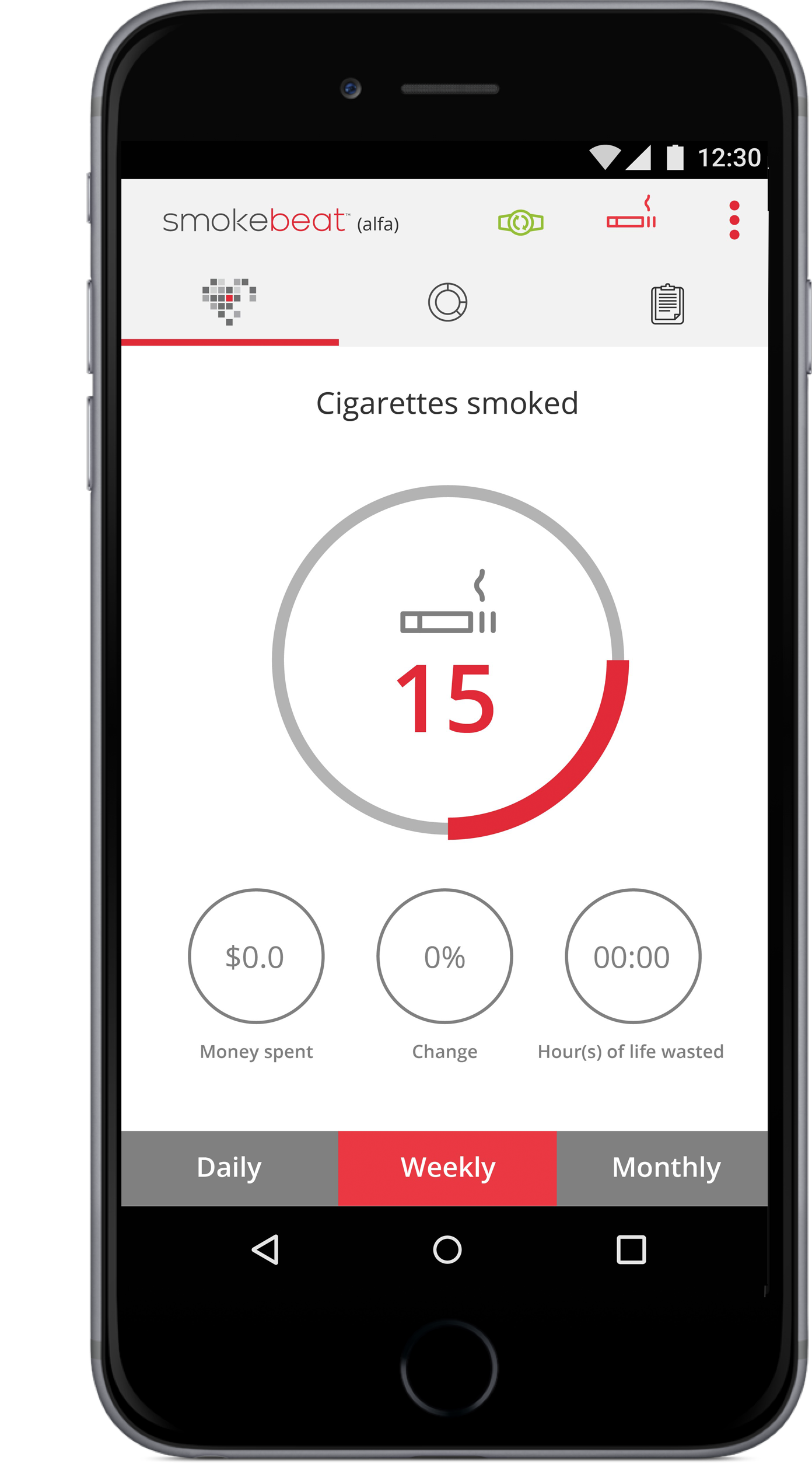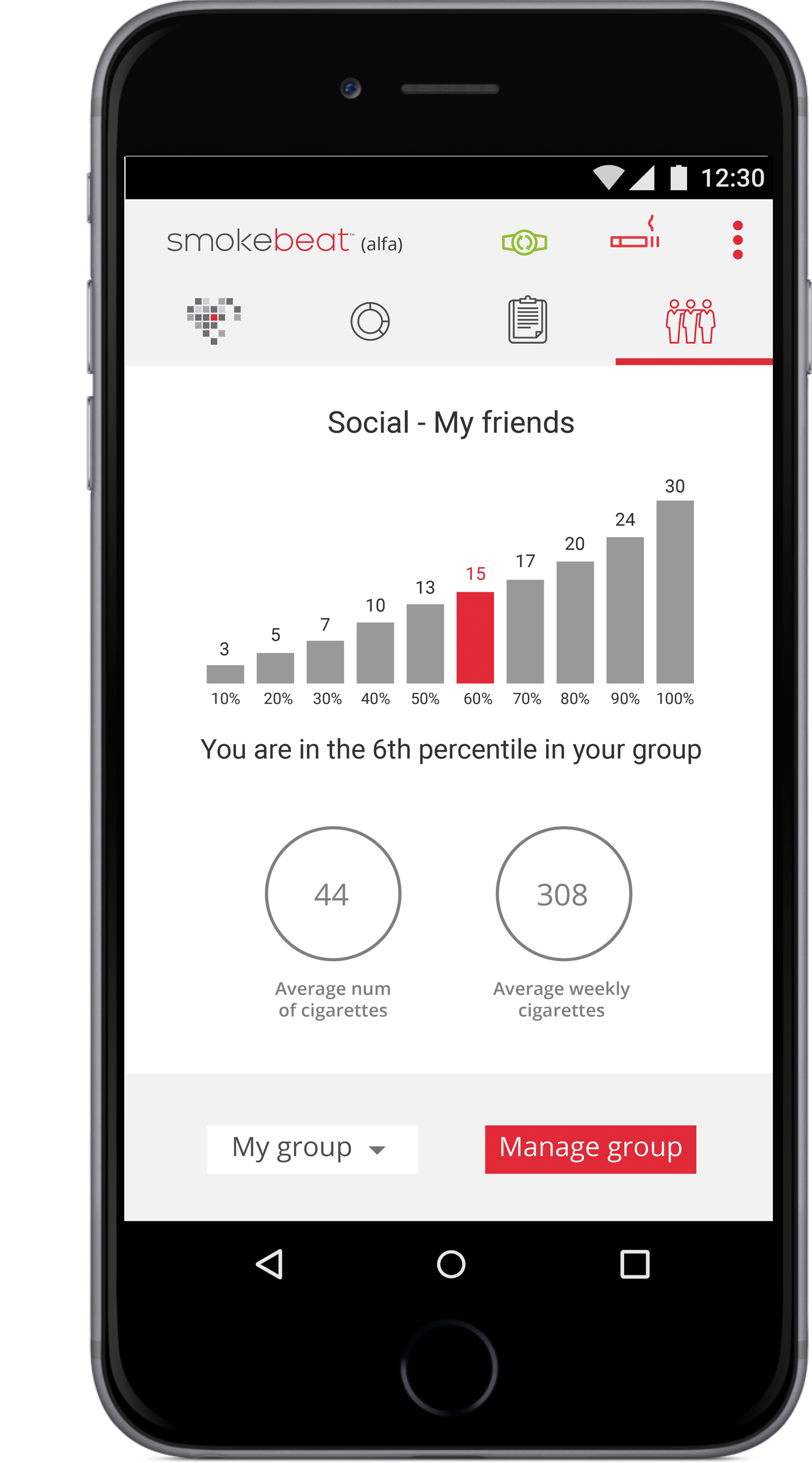Smokers in the United States, Canada, France, Israel and Turkey are participating in trials to quit the habit with the help of an Israeli app called SmokeBeat from Somatix.
Distinct from hundreds of smoking-cessation apps already available, SmokeBeat is the first to detect smoking in real time based on hand-to-mouth gestures picked up by sensors built into smartwatches and wristbands.
“Physicians tell us they’re excited that they now have the possibility to apply immediate interventions based on what the patient is doing in real time,” says Eran Ofir, cofounder and CEO of Somatix.

In addition to remote monitoring for the clinician, SmokeBeat uses principles of cognitive behavioral therapy (CBT) to send out financial, emotional, rational and social incentives most likely to motivate behavioral changes in the individual user, tailored with the help of machine learning and big-data analytics.
For example, if the cost of cigarettes is of most concern to you, SmokeBeat will emphasize how much your habit busts your budget and how much you’d save by cutting back.
Users can see and sort smoking statistics and alerts, set goals, compare progress to others and receive credits and incentives.
Once the clinical data from pilots is validated in early 2018, Somatix plans to market SmokeBeat to employee-benefits programs (which are offered by 86 percent of US employers), outpatient clinics and insurance companies as a tool to improve compliance with prescribed cessation therapies.
“Half of the insurance companies in the US are utilizing wearable devices to offer dynamic pricing to customers,” Ofir tells ISRAEL21c. “They reduce your premium based on your health habits, even giving the wearables for free so they can monitor and help their customers lead a healthier lifestyle.”
Individuals already can download the app on iOS or Android even if they’re not involved in a smoking-cessation program.
“There won’t be a clinician monitoring your progress in that case, but we have found, as psychologists working with us predicted, that just the mindfulness effect of the app causes a decrease of 15 to 20% of smoking volume,” says Ofir. “Applying CBT techniques adds another 40%.
“When you place data in front of people about how much they actually smoke and the financial cost and health cost, without any external intervention we see people reducing their smoking volume.”

Results of the first pilot study of SmokeBeat recently were published in the Oxford University Press journal Nicotine and Tobacco Research.
The 40-person study, led by Prof. Reuven Dar of Tel Aviv University’s School of Psychological Sciences, showed that monitoring and notifying smokers about smoking episodes immediately via the SmokeBeat app led to a significant reduction in smoking volume.
“We were impressed with the results,” said Dar. “The SmokeBeat algorithm detected correctly more than 80% of the smoking episodes and produced very few false alarms.”
SafeBeing
The Somatix BMD (body motion detection) software platform will power additional products.
“In early 2018 we will soft-launch SafeBeing, an app for eldercare for which we already have orders pending,” says Ofir.
“All you need is an off-the-shelf smartwatch or wristband and we can tell remotely how much the individual is walking, drinking, sleeping, smoking, taking medications, and other activities. The system can notify the caregiver and geolocate a person who gets lost. This unique product can help determine deterioration or improvement in functionality of the elderly person.”
The BMD platform was developed by cofounder Uri Schatzberg, now CTO of the company. At first, he was not sure how to apply his invention, which takes raw data from sensors in wearables and processes and analyzes that data to detect movement indicating that the person is eating, shaving, brushing teeth, taking medication, smoking, and so on.
“We thought it could be useful in healthcare, especially for activities of daily living (ADL) evaluations and for addictions such as smoking,” says Ofir.
“So we built the MVP [minimum viable product] for smoking and to make it very special we worked with Prof. Dar and others at Pennsylvania and Yale universities to do the clinical evaluation. We took methodologies of CBT and translated them into machine-learning algorithms.”
https://youtu.be/q8JutmMPpM8
American and international statistics show 50% of smokers are trying to quit but only 7% succeed permanently, Ofir says.
“The reason is the gap between visits to clinicians and what patients report to clinicians. This is what we are trying to fill with our remote monitoring system. The clinician can see everything about the habits of the person — how much and how long and where and when, how many cigarettes per day, week and month – without patients having to enter all that data themselves.”
Founded in February 2015, Somatix developed its business plan at two US healthcare accelerators in 2016, Dreamit Health in Philadelphia and the New York Digital Health Accelerator. Somatix was the first Israeli company accepted to both. In April 2017, Digitalis Ventures of New York invested in Somatix.
Somatix won the startup pitch competition held by Global Healthcare Resources in Los Angeles last October as part of the ninth Employer Healthcare & Benefits Congress.
The company’s R&D center in Ra’anana employs 19 people, while Ofir is building up a front office in New York.
For more information, click here.

















